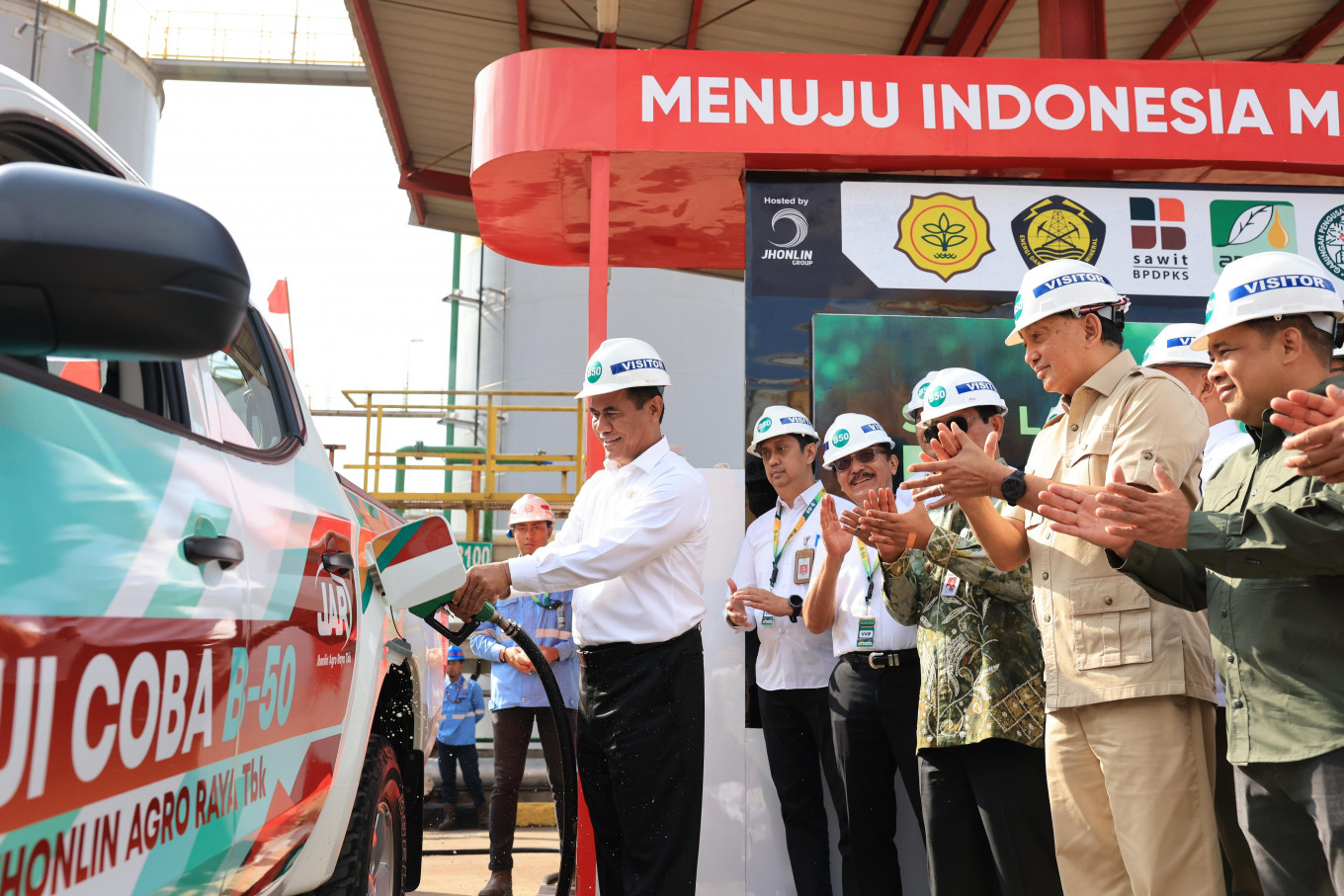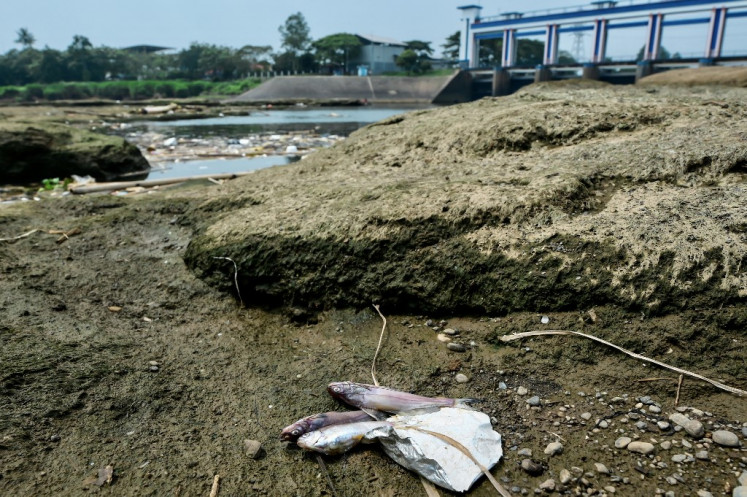Popular Reads
Top Results
Can't find what you're looking for?
View all search resultsPopular Reads
Top Results
Can't find what you're looking for?
View all search resultsEuro 4 fuel could save Rp 550b in healthcare costs
Euro 4 fuel standards require a maximum sulfur content of 50 parts per million (ppm) while fuels sold in Indonesia range from 150 to 400 ppm for gasoline and from 300 to 2,000 ppm for diesel.
Change text size
Gift Premium Articles
to Anyone
 Agriculure Minister Andi Amran Sulaiman fills B50 biodiesel fuel into a road-test vehicle during a softlaunch ceremony marking the use of B50 at PT Jhonlin Agro Raya biodiesel factory in Batulicin, Tanah Bumbu regency, South Kalimantan, on Aug. 18, 2024. Amran said that the B50 trial represented a key step toward achieving national food sufficiency and energy independence. (Courtesy of Agriculture Ministry/-)
Agriculure Minister Andi Amran Sulaiman fills B50 biodiesel fuel into a road-test vehicle during a softlaunch ceremony marking the use of B50 at PT Jhonlin Agro Raya biodiesel factory in Batulicin, Tanah Bumbu regency, South Kalimantan, on Aug. 18, 2024. Amran said that the B50 trial represented a key step toward achieving national food sufficiency and energy independence. (Courtesy of Agriculture Ministry/-)
T
he full implementation of Euro 4 fuel standards in Jakarta is projected to save up to Rp 550 billion (US$34.7 million) annually in healthcare costs by 2030.
Euro 4 fuel is a standard the European Union established to reduce harmful vehicle emissions and improve air quality. This calculation comes from the Impact Analysis of Fuel Quality Standards released by the energy and environmental think tank the Institute for Essential Services Reform (IESR) on Tuesday.
"Currently, the quality of fuel available in Indonesia, especially diesel and gasoline, is still far from international standards and those that have been implemented in developed countries," said IESR executive director Fabby Tumiwa in Jakarta, as quoted by Antara news agency.
Most gasoline available in Indonesia, such as Pertalite and Pertamax, contains sulfur levels ranging from 150 to 400 parts per million (ppm). However, Euro 4 standards require sulfur content to be reduced to a maximum of 50 ppm. Pertamax Turbo already meets this requirement, as does Pertamax Green, introduced in 2023, which also contains 5 percent of bioethanol (BE5).
The current diesel fuel quality is still far from Euro 4 requirements. Biosolar contains up to 2,000 ppm of sulfur, while Dexlite has 1,200 ppm, both falling short of the Euro 2 standard. Pertadex, which meets Euro 3 with 300 ppm sulfur, still does not meet the Euro 4 standard, which was implemented by EU member states in January 2006.
The adoption of Euro 4 fuel is expected to reduce air pollution by 90.26 percent, leading to an 86 percent drop in pneumonia cases, a 69 percent reduction in ischemic heart disease cases, and an 84 percent decrease in chronic obstructive pulmonary disease (COPD) cases by 2030 in Jakarta.
According to Health Care and Social Security Agency (BPJS Kesehatan) data, Jakarta's cost of treating air pollution-related diseases reached Rp 1.2 trillion in 2023. Ischemic heart disease, which cost Rp 471 billion, and pneumonia, which cost Rp 409 billion, are major contributors to this figure.
The IESR urged the Energy and Mineral Resources Ministry to quickly implement Ministerial Regulation No. 20/2017, which sets fuel specifications for Euro 4 vehicles.
The government is also encouraged to create a road map for tightening vehicle emission standards and ensuring a steady supply of fuel that meets these new requirements.
To meet Euro 4 standards, the IESR recommended boosting domestic fuel production and increasing imports of compliant fuels.
State-owned oil and gas producer PT Pertamina will need to invest in refinery upgrades, either through public-private partnerships (PPPs) or state capital injections. Since about 30 percent of fuel in Indonesia is imported, the government should also prioritize shifting imports to Euro 4-compliant fuels in the short term.
While adopting Euro 4 standards will raise fuel costs by an estimated Rp 200 per liter, the impact on the subsidy budget is expected to be manageable.
The IESR projected an increase of Rp 5.5 trillion in subsidies during the first year, rising to Rp 16 trillion by 2028. However, this cost is still much lower than the current annual fuel subsidy allocation.
EU member states implemented Euro 5 standard starting in January 2011 and Euro 6 standard in September 2015. A very stringent Euro 7 standard is set to take effect in 2026, which includes non-exhaust emissions, such as from brakes and tires.
Editor's note: This article has been updated to correct an erroneous job title.










